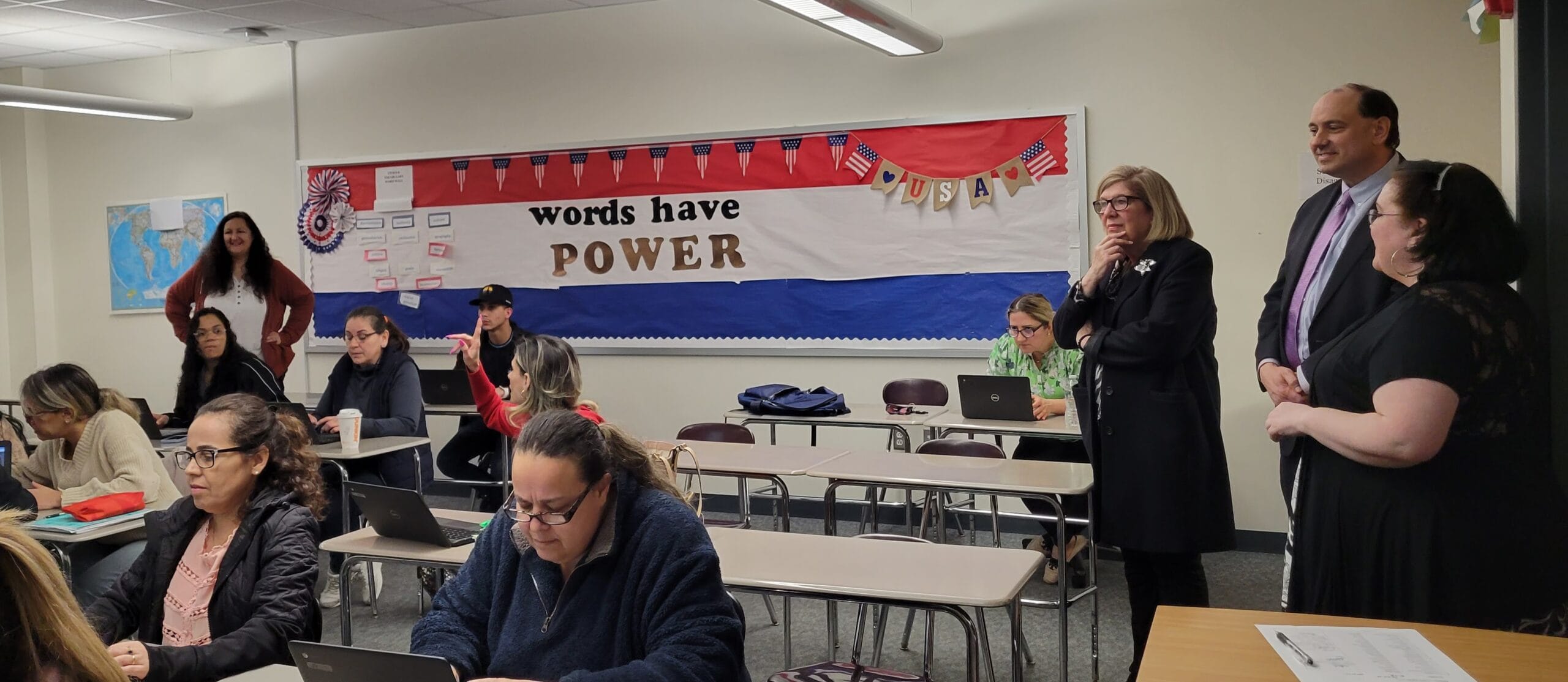
HUDSON — In 1985, the Hudson Maynard Adult Learning Center opened its doors, and now there are plans to expand the program to serve more learners than ever.
“With a high population of English Language Learners [ELLs], the need for English for Speakers of Other Languages [ESOL] classes in the area was quite apparent,” Director of Adult Education Brenna Kane said.
The center, which changed its name to the Hudson Adult Learning Center (HALC) after moving to the Hudson High School, has always been mainly funded by grants from the Department of Elementary and Secondary Education (DESE) with a small match from the school in the form of space and staff support.
Currently, there are 15 classes, consisting of 12 ESOL and 3 High School Equivalency (HSE) classes; two advisors for student support; an administrative assistant and a Director of Adult Education.
Kane said the program grew “quite a bit” in the beginning years and currently serves 200 students a year.
They are always full and have a waitlist of potential students. Registration happens at the end of August each year, Kane noted, but they always prioritize waitlist students for every seat that becomes available.
“Unfortunately, with high and ever-increasing demand, especially for ESOL, the waitlist for a seat in class was routinely exceeding 200 people,” said Kane. “Thanks to the leadership of the current Hudson Superintendent Dr. Marco Rodrigues, I was able to apply for a substantial new grant to expand to 250 seats.”
Rodrigues had been frustrated with the waitlist situation since a new Hudson resident could wait up to two years for a seat, so he worked towards getting a new grant with Kane, who shared his vision.
After the retirement of the previous director, Kane assumed the role and, using her 20 years of leadership in adult education, “immediately began writing the 100-page grant proposal— laying out the community needs.”
“We were approved for [a] nearly 70% increase to meet these goals, and we will remain funded at that level for the next five years before we need to reapply,” said Kane.
In addition to the new seats, Kane was able to purchase Chromebooks for their students to mirror the 1:1 tech ratio for the public schools. The new grant will allow them to serve 25% more residents and incorporate modern instruction skills.
While they have always taught ESOL and HSE classes, there will be digital literacy courses added in the fall to prepare their students for 21st century college and career opportunities.
“Coming this fall, we will be hiring two more ESOL teachers and a full-time Digital Literacy Teacher/coordinator,” said Kane.
The goal is to reduce the waitlist, increase their enrollment capabilities, serve more learners and offer the Digital Literacy curriculum with the new grant monies, which begins on July 1.
The HALC benefits the Hudson community because “every community needs educated, informed and self-sustaining residents in order to function,” she said.
Kane added, “For residents who cannot complete their high school education in a traditional way, we offer an alternative path toward that essential diploma and the skill set it represents. For the newest Americans, learning English as quickly as possible is crucial to every facet of their lives here.”
English language skills are important in getting a job, supporting their children in school, accessing resources and getting medical care, Kane said. Adult learners are supported with quality education “at no cost to the learners themselves.”
She said, “All learners have to do is show up for class ready to put in the work.”
Kane emphasized that studies have consistently shown the “incredible benefits of programs that address illiteracy.” For every dollar spent on adult education like HSE or ESL classes, states show a return of seven dollars to the taxpayers, she noted.
She said, “That’s because for every adult who becomes proficient in English or achieves their high school equivalency diploma, there are reductions in the reliance on public assistance programs like Section 8, TANF, SNAP and heating fuel programs, to name a few.”
She said when these learners become self-sufficient, they can earn a wage.
As someone who dropped out of high school, Kane’s work with adult learners is important to her because it is personal.
“I knew I wanted to be a teacher so I earned my Bachelor’s degree and started my career teaching elementary school,” she said. “When I needed extra income, I took a night job teaching a GED class and immediately knew I’d found my calling.”
With the earning of a Master’s degree in Adult Education, she said it was the “career of her dreams.”
“It is more rewarding than I could ever find words to express,” Kane said. “We’re making the world a better place, one adult learner at a time.”
For more information, visit https://www.hudsonadulted.org/.












